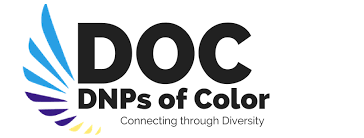When Danielle McCamey DNP, CRNP, ACNP-BC, FCCP, was searching for other nurses of color who were on the same path to a doctorate degree in nursing, she had a tough time. Knowing she couldn’t be the only one seeking a similar camaraderie, McCamey founded DNPs of Color, a nonprofit focused on building the community she was hoping to find.
“When I got my DNP, I was the only Black woman, and I had a different lived experience from my cohort mates,” says McCamey, now DNPs of Color’s president and CEO. “I craved a community.”
In 2016, McCamey approached several professional nursing organizations. She pitched the idea of an organization focused on building a community of nurses of color who were on the path to earn the DNP, had earned it, or were just beginning to think about getting this advanced degree. No one followed up on the idea, so McCamey took it on as a personal project and started up a DNPs of Color Facebook page hoping to connect with others on her own. “That blew up,” she says. “It was beyond my expectations, and there were so many similar stories.”
As a first-generation student, McCamey’s academic track was new to her family. “There was lots of pressure to succeed and to represent myself for my community, my family, my ancestors,” she says. And she also wanted a sense of validation on her journey, one in which she experienced microaggressions, implicit bias, and racism.
A Lived Experience
McCamey is so passionate about DNPs of Color because of her own history. If not for the encouragement and guidance of Bimbola Akintade PHD, MBA, MHA, CCRN, ACNP-BC, NEA-BC, FAANP, she never would have considered earning a DNP. The two were colleagues (Akintade is a DNPs of Color board member), and McCamey was in her second year as an NP when he suggested she earn a higher degree.
“I had a small voice in my head that I was not capable,” she says, recalling a high school guidance counselor who told her that because she was Black and from a single-parent family, she’d never make it to college. An encouraging track coach changed her mind, and she was accepted to all 20 colleges she applied to (and, yes, she has since informed her old guidance counselor of her successes). Based on her own lived experiences, McCamey says DNPs of Color is dedicated to giving voice to those who have been silent or silenced for so long.
Establishing an Organization
In 2018, McCamey moved DNPs of Color to a nonprofit status because there was nothing else like her organization, and she knew how much it could help other nurses. The first virtual program DNPs of Color held was a virtual commencement and the immediate and enthusiastic feedback was encouraging. “It was about elevating stories of students of color earning their degrees,” she says. “There are so many stories. I never get tired of people saying this organization serves a purpose and ultimately impacts patients and health equity.”
The new focus of the Future of Nursing 2020-2030 report puts DNPs of Color in a direct position to support DNP students, diversity, and those in the BIPOC community, says McCamey. Right now, DNPs of Color is a social media-based platform with plans to move into a membership-based format next year. For now, she encourages anyone interested to join DNPs of Color’s private Facebook or LinkedIn groups so they will be alerted to the new strategies in the new year.
Guiding Lights
With three guiding pillars, McCamey says DNPs of Color focuses on networking, mentoring, and advocacy. Within those pillars, nurses are able to connect and learn essential guidance for moving forward in their careers, gaining fellowships, professional development tips, or navigating speaking and teaching engagements. “Many people do not understand the value of networking,” says McCamey because they may have never had mentors who can demonstrate it. “It opens up so many opportunities.”
Mentors, she says, are needed in all aspects of life–personal and professional. When McCamey finally had her DNP in hand, she says she wasn’t quite sure what was expected and what she could do to contribute to her community and give back. It was almost a feeling of “I did this, but now what?”
The advocacy piece of the organization is devoted to serving people of color and those who are historically marginalized or excluded, says McCamey. It’s about nurses doing what they can to make nursing and healthcare more equitable. Nurses with a DNP have a special skill set, she says, as they are well versed in academia and in clinical practice. They know how to create policies that are possible, effective, and nursing- or patient-focused. “For people of color, healthcare outcomes increase when implicit bias decreases,” she says. “Patients want to see people who look like them. If we are there, it promotes diversity.
The DNPs of Color community continues to grow daily, says McCamey. “As an organization, I am expecting that we are going to grow exponentially. And as the push for DEI increases, we will be instrumental in moving that needle forward.”
- WOC Nurses Week Highlights Specialty - April 16, 2024
- Honoring Radiology Nurses Day on April 12 - April 12, 2024
- Travel Offers New Career Possibilities - April 8, 2024



